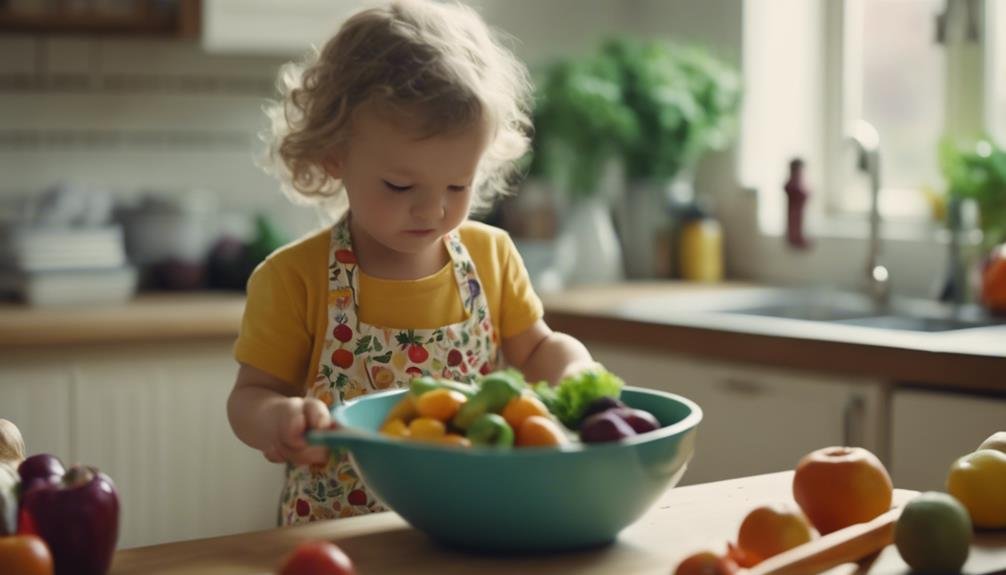"Cherishing Little Steps - A Haven for Baby and Family Journeys"
Mastering Mealtime: Strategies for Feeding Picky Toddlers
When it comes to feeding discerning young eaters, you may encounter some culinary challenges that require finesse and patience. However, rest assured, there are effective strategies that can help you navigate through mealtimes with your picky toddler. By implementing a few key techniques and staying committed to fostering a positive eating environment, you'll be on your way to transforming mealtime battles into enjoyable and nourishing experiences for both you and your little one.
Key Takeaways
- Create a positive mealtime environment to expand their palate gently.
- Offer a variety of nutritious options without pressure.
- Involve toddlers in meal prep for engagement and life skills.
- Establish consistent mealtime routines for a calm atmosphere.
- Use positive reinforcement and encouragement for exploration without force.
Understanding Picky Eating Behaviors

If your little one is being selective with their food choices, understanding the reasons behind their picky eating behaviors can help you navigate mealtimes more effectively. Picky eating in toddlers is a common phase that many children go through as they explore new tastes and textures. It's essential to remember that this behavior is often a normal part of their development and not something to cause undue stress. Toddlers may exhibit picky eating due to sensory sensitivities, a need for control, or simply because they aren't hungry. By recognizing these factors, you can approach mealtimes with patience and empathy.
Encouraging a positive mealtime environment by offering a variety of nutritious foods and allowing your child to explore and experiment can help expand their palate over time. It's important to avoid pressure or force-feeding, as this can lead to further resistance. Remember, every child is unique, and progress may take time. By understanding your little one's picky eating behaviors, you can support them in developing healthy eating habits for the future.
Setting Realistic Expectations
Setting realistic expectations when dealing with picky toddlers can greatly improve mealtime experiences for both you and your child. It's essential to understand that toddlers are still exploring their tastes and preferences. Avoid expecting them to eat large portions or always try new foods without hesitation. Instead, focus on providing a variety of nutritious options and allowing them to choose what and how much they want to eat. Remember, toddlers have small stomachs and may need multiple exposures to a new food before accepting it. Be patient and avoid pressuring them to clean their plates.
Additionally, keep in mind that toddlers' appetites can vary greatly from day to day, so fluctuations in their eating habits are normal. By setting realistic expectations and approaching mealtimes with flexibility and understanding, you can reduce stress and create a positive environment for your picky eater. Celebrate small victories and remember that progress takes time. Your patience and support will help your child develop healthy eating habits in the long run.
Involving Toddlers in Meal Prep

When involving toddlers in meal prep, encourage them to help with simple tasks like washing fruits or stirring ingredients to make them feel included and excited about the cooking process. Toddlers love to be helpers, and involving them in meal preparation can be a fun and educational experience for both of you. Here are some simple ways to get your little one involved:
- Washing fruits and vegetables: Let your toddler help rinse fruits and veggies under running water. This task is easy, safe, and can make them feel like they're contributing to the meal.
- Stirring ingredients: Give your toddler a child-safe spoon and a bowl to stir ingredients. Even if their stirring doesn't do much, they'll love feeling like they're cooking alongside you.
- Placing toppings: If you're making pizzas or salads, let your toddler add toppings. This can be a creative activity that allows them to personalize their food.
Involving toddlers in meal prep not only encourages their interest in food but also fosters valuable life skills and creates lasting memories of quality time spent together in the kitchen.
Offering a Variety of Foods
To ensure your picky toddler gets a balanced diet and develops a diverse palate, it's important to offer a variety of foods regularly. Toddlers can be quite selective with what they eat, but exposing them to different tastes and textures can help expand their preferences. Here are some practical tips to help you introduce a variety of foods to your little one:
| Food Group | Examples |
|---|---|
| Fruits | Berries, bananas, apples, oranges |
| Vegetables | Carrots, broccoli, peas, sweet potatoes |
| Proteins | Chicken, tofu, lentils, eggs |
| Grains | Whole grain bread, rice, pasta, quinoa |
Implementing Mealtime Routines

Establishing a consistent mealtime routine can greatly benefit your picky toddler's eating habits and overall well-being. Toddlers thrive on routine and predictability, so creating a structured meal schedule can help set the stage for successful mealtimes. Here are some practical tips to help you implement mealtime routines effectively:
- Set regular meal and snack times: Establish set times for breakfast, lunch, dinner, and snacks throughout the day. Consistency in timing can help regulate your toddler's appetite and create a sense of stability.
- Create a calm and inviting atmosphere: Make mealtime a pleasant and relaxed experience by minimizing distractions and setting a positive tone. Turn off the TV and put away electronic devices to focus on enjoying food together.
- Encourage family meals: Eating together as a family can promote healthy eating habits and social skills. Sit down with your toddler during meals and engage in conversation to create a nurturing environment.
Creating a Positive Eating Environment
To create a positive eating environment for your picky toddler, focus on fostering a relaxed and enjoyable atmosphere during mealtimes. Set the stage by eliminating distractions like television or toys at the table. Encourage pleasant conversations and make mealtime a family affair by sitting together at the table. Engage your toddler in meal preparation or decision-making to pique their interest in the food being served.
Create a visually appealing setting by using colorful plates or fun placemats. Consider playing soft background music to enhance the mood. Be mindful of your own attitude towards food; children often mimic their parents, so demonstrating a positive relationship with eating can influence your toddler's behavior.
Avoid pressuring your child to eat certain foods or finish everything on their plate. Instead, offer a variety of nutritious options and let them explore at their own pace. Celebrate small victories and be patient through the process. Remember, creating a positive eating environment is about fostering a healthy relationship with food that will benefit your child in the long run.
Avoiding Food Battles

When navigating mealtimes with your picky toddler, sidestepping food battles can be achieved by offering choices and maintaining a calm demeanor. It's understandable that mealtimes can become stressful when your little one refuses to eat, but there are ways to avoid turning it into a battleground.
Here are some practical tips to help you navigate this challenging situation:
- Offer a variety of options: Present your toddler with a few healthy choices to pick from. This gives them a sense of control and may increase their willingness to try new foods.
- Avoid power struggles: Refrain from turning mealtimes into a battle of wills. Stay calm and patient, and try not to force your child to eat a particular food.
- Set a positive example: Show your toddler that mealtime is enjoyable by displaying a positive attitude towards food. Children often mimic their parents' behavior, so be a role model for healthy eating habits.
Being Patient and Persistent
Remaining patient and persistent is key when dealing with a picky toddler during mealtimes. Toddlers can be quite challenging when it comes to trying new foods or even eating the ones they usually enjoy. It's essential to approach mealtime with a calm and consistent attitude. Here are some practical tips to help you navigate through these moments:
| Be Patient | Be Persistent |
|---|---|
| 1. Stay calm and avoid showing frustration. | 1. Continue offering a variety of foods, even if they are rejected initially. |
| 2. Give your toddler time to explore and interact with the food. | 2. Offer foods multiple times in different ways (cooked, raw, mixed in dishes). |
| 3. Encourage small tastes without pressure. | 3. Stick to regular meal and snack times to establish a routine. |
| 4. Celebrate small victories and progress. | 4. Avoid substituting rejected foods with preferred alternatives. |
Using Positive Reinforcement

Encouraging positive behavior through reinforcement can be a powerful tool in helping your picky toddler develop better eating habits. Positive reinforcement focuses on acknowledging and rewarding good eating behaviors rather than punishing undesirable ones.
Here are some practical ways to implement positive reinforcement with your little one:
- Praise: Offer genuine praise when your toddler tries a new food or eats a well-balanced meal. Positive words can boost their confidence and make mealtime more enjoyable.
- Reward Charts: Create a fun reward chart where your child can earn stickers or stars for each positive eating behavior. This visual representation can motivate them to continue making healthy choices.
- Special Privileges: Consider offering small privileges, like choosing a favorite dessert or having extra playtime, as a reward for good eating habits. These incentives can make mealtime feel like a positive experience for your toddler.
Seeking Professional Help if Needed
If you find that your attempts to improve your picky toddler's eating habits are not yielding positive results, considering seeking professional help from a pediatric nutritionist or child psychologist. These experts can provide valuable insights and strategies tailored to your child's specific needs. Remember, every child is unique, and sometimes professional guidance can make a significant difference in overcoming feeding challenges.
| Reasons to Seek Professional Help | Benefits |
|---|---|
| Your toddler's picky eating is causing significant stress in your family. | Professional guidance can help alleviate stress and provide effective solutions. |
| You have tried various strategies without success, and you feel overwhelmed. | Experts can offer new perspectives and techniques to address feeding difficulties. |
| Your toddler's limited diet is affecting their growth and development. | Professionals can create specialized meal plans to ensure your child receives adequate nutrition. |
Don't hesitate to reach out for help when needed. Your child's well-being is worth the investment in professional support.
Frequently Asked Questions
How Can I Encourage My Toddler to Try New Foods?
Encouraging your toddler to try new foods involves introducing them slowly, offering variety, and being a positive role model. Make mealtime fun, involve them in food prep, and praise their efforts. Persistence and patience are key!
What Are Some Creative Ways to Make Mealtime Fun for Toddlers?
To make mealtime fun for toddlers, try turning food into colorful art on their plates. Engage them with interactive dishes like build-your-own tacos or fruit skewers. Let them play with their food a bit—it might just make them eager to eat!
Should I Worry About My Toddler's Food Preferences Changing?
Don't stress about your toddler's food preferences changing. It's normal for tastes to evolve. Keep offering a variety of healthy foods in a positive environment. Stay patient and consistent; it's all part of their growth.
Are There Any Tips for Dealing With Food Refusal During Meals?
When dealing with food refusal during meals, try offering a variety of foods in small portions, involve your toddler in meal preparation, make mealtimes enjoyable, and stay patient. Remember, it's normal for toddlers to be picky eaters.
How Can I Balance Nutritious Foods With Toddler Favorites?
You can balance nutritious foods with toddler favorites by sneaking in veggies into their favorite dishes, offering a variety of healthy options, and involving them in meal prep. Making food fun and colorful can also help!
Conclusion
In the journey of mastering mealtime with picky toddlers, remember that it's like planting seeds in a garden. Just as you patiently nurture and water the seeds, your efforts in introducing new foods and mealtime routines will eventually bloom into healthy eating habits.
Stay persistent, celebrate small victories, and seek help when needed to create a positive mealtime environment for your little ones to flourish.
Keep on nourishing those growing taste buds!



परिपक्व अश्लील देखो